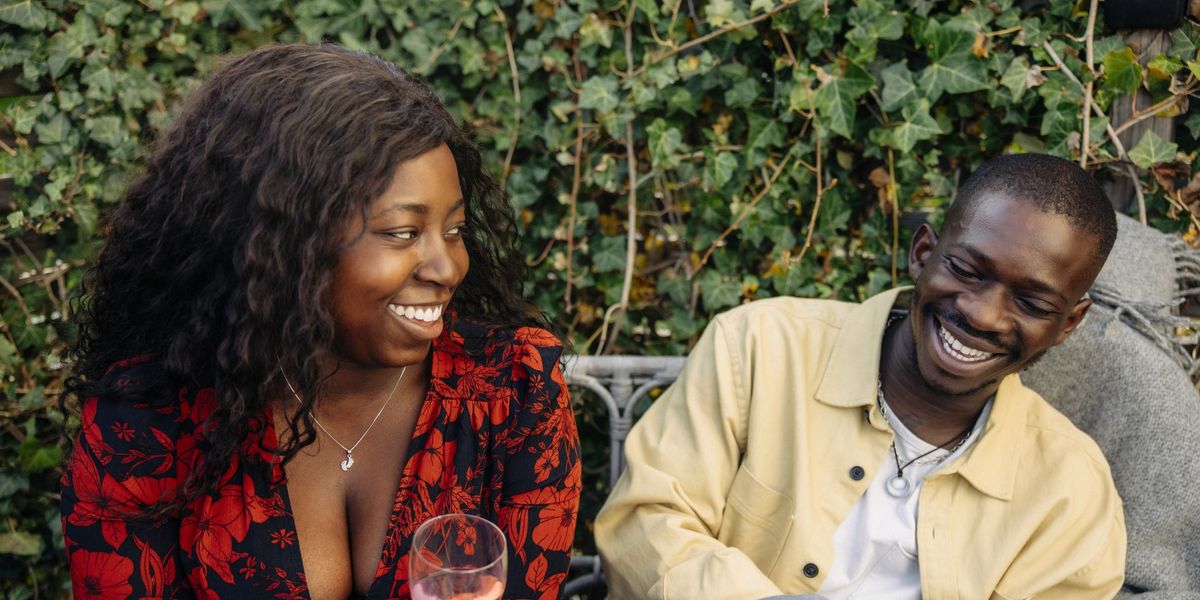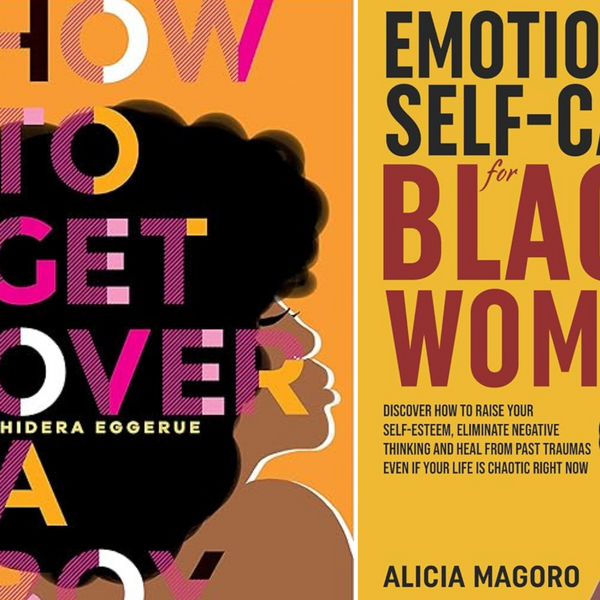
How To Discover What Your Dating Needs Are, According To An Expert
It's no secret that the dating scene is different from our parents' generation, so as a hopeful romantic, many parts of me feel like I was born in the wrong lifetime. My mother often says that she feels like my husband will be a bit older than me; perhaps that was her way of telling me that she hopes I find someone more mature. But these days, between the countless podcasts debating gender roles and discussions online of who brings what to the table, finding your person can feel hopeless.
Still, people are finding love every day, so how can we go from being amongst the brokenhearted and nonbelievers? How can we get to the meat of what our needs truly are to find the love we've been searching for? Beverley Andre, Licensed Marriage and Family Therapist says that the key is getting out of your own way.
Q: How can we get in our own way when it comes to relationships?
A: We get in our own way in relationships by having rigid expectations that make it difficult or impossible for someone to meet. I know this is a hot topic regarding having and maintaining standards, but there’s a fine line between reasonable expectations and creating a barrier that is nearly impossible to break through.
You have to assess the standards and see if they are genuinely in protection of you and maintain the standard of how you want to be treated, or are the standards fueled by fear and what you're really trying to do is avoid feeling hurt and disappointed, so you create this cycle where you set impossible standards that no one can meet, therefore limiting the possibility of close intimate relationships, leaving you feeling lonely and frustrated.
Q: In this dating age and era, how can we determine what our needs are versus our wants?
A: Your needs are tied to the core values and belief systems, while the wants are personality and lifestyle considerations, so I recommend creating a list of both. Identify your core values early on because those are your principles and qualities that matter most to you in a relationship. Those values are fundamental to your overall well-being. For example, do you want to be with someone who wants children, has integrity, and aligns on finances? Your values should be your deal-breakers that weed out people who are not in alignment.
For wants, think of physical, personality, and lifestyle traits that aren’t necessarily deal-breakers, aren’t tied to someone’s core traits, and don’t compromise your mental wellness. For instance, enjoying 100% of the same interests, specific physical attributes, and shared cultural background. As an extra measure, I recommend discussing your needs and wants with a trusted inner circle and getting their feedback. An inner circle should give you fair feedback instead of just agreeing with it because they’re within the inner circle.
"Your needs are tied to the core values and belief systems, while the wants are personality and lifestyle considerations."
Q: Are there fundamental needs that everyone should have or has on some level in romantic partnerships?
A: Yes, to be seen and heard. No one wants to be in a romantic partnership where they feel invisible, and their needs are met with consistent resistance just because it’s different from their partner. One of the core issues I see with couples is their inability to make space for their partner’s voice and influence. They find it difficult to see the value in what their partner is saying, especially if it contradicts their thoughts and opinions. Therefore, they register it as not being good enough and lacking merit and then get into a cycle where they inadvertently want their partner to change their minds and prove to them why they have a point.
Q: What are different examples of needs that everyone has?
A: Respect, open communication, similar values, sexual chemistry, and feeling safe emotionally and physically.
Q: How can we get to the meat of what our needs are so we can in turn get better at communicating what our needs are from an empowered place versus a disempowered one?
A: Identify your unmet childhood needs and heal them. I often see people trying to heal these wounds in relationships with people who aren’t responsible for creating them or fixing them. You can communicate your needs from an empowered and healthy place if you’re not starving. Getting to the meat of your needs will require self-exploration, curiosity, and patience to understand why the need is even a need.
"Identify your unmet childhood needs and heal them. You can communicate your needs from an empowered and healthy place if you’re not starving."
Q: What do you find your clients who are succeeding in relationships have done differently in explaining their needs to their partner?
A: They have done the self-work and healing to know their needs through individual and/or couple’s therapy. Most of the clients I’ve worked with never had the space to develop their thoughts around their needs. They’ve adopted their needs based on what they’ve seen in their personal lives from family growing up, movies, and now social media. Until you have a healthy relationship with yourself, where you’ve identified your needs and are meeting them, it isn’t easy to have that with someone else. You can’t communicate and give what you don’t know and have.
Let’s make things inbox official! Sign up for the xoNecole newsletter for daily love, wellness, career, and exclusive content delivered straight to your inbox.
Featured image by Maskot/Getty Images
- Tailor Your Love Life To Meet Your Needs With The Help Of This Viral Dating Practice ›
- The Classy Way To End A Relationship ›
- Here’s Why You KEEP Not Getting What You Need In Your Relationships ›
- What If You Love Him But Your Needs Keep Not Being Met? ›
Dubbed one of the "21 Black Women Wellness Influencers You Should Follow" by Black + Well, Yasmine Jameelah continues to leave her digital footprint across platforms ranging from Forever 21 Plus, Vaseline, and R29 Unbothered discussing all things healing and body positivity. As a journalist, her writing can be found on sites such as Blavity, Blacklove.com, and xoNecole. Jameelah is also known for her work shattering unconventional stigmas surrounding wellness through her various mediums, including her company Transparent Black Girl. Find Yasmine @YasmineJameelah across all platforms.
This article is sponsored by Hulu.
UnPrisonedhas returned for its highly anticipated second season, delving deeper into the complex dynamics of the Alexander family.
The series premiere comes a year after its debut season garnered rave reviews from fans and critics and earned record-breaking ratings for Hulu's Onyx Collective brand. UnPrisoned's success can be attributed to its raw, relatable themes and comedic appeal.
Inspired by creator Tracy McMillan's life, the show follows Paige (Kerry Washington), a therapist and single mother whose life takes an unexpected turn when her father, Edwin (Delroy Lindo) --who was released from prison-- moves in with her and her teenage son, Finn (Faly Rakotohavana).
Throughout UnPrisoned's first season, viewers witnessed how Edwin's incarceration deeply affected Paige's life and relationships. In the series, Paige unpacks her trauma through interactions with her inner child and her online followers. Meanwhile, Edwin is overcoming specific struggles with his own past that led to his life of crime, including a dysfunctional upbringing and his mother's arrest. As the Alexanders attempt to reconcile, new challenges arise.
This new season promises to further explore their unconventional family dynamic. Here are several compelling reasons why season two of UnPrisoned should be on everyone's watchlist.
The Alexander Family Life Is Still In Shambles
UnPrisoned's second season resumes where the series left off, with Paige grappling with the fallout from her troubled therapy practice and Edwin navigating life independently after moving out. Meanwhile, Finn faces his own challenges. The teenager is battling anxiety and seeking information about his father—a topic Paige avoids discussing.
The Alexander Family Are Attending Therapy To Resolve Their Underlying Issues
Amid the chaos in their lives, the Alexander family decides to mend their bond by confronting their past traumas. They seek professional help and attend therapy sessions with a “family radical healing coach,” played by John Stamos, a new cast member. This collective effort aims to unravel the complexities of their shared history and strengthen their relationships.
The process of unraveling each character's internal conflicts and their potential impact on future relationships may clash with Paige's textbook therapy approach. While Paige is used to being in the therapist's seat in both career and family, this forces her into the unfamiliar role of a patient during therapy sessions. This shift would compel her to look in the mirror and try a radically different approach.
The Alexander Family Learned A Big Lesson During A Therapy Session
In therapy, the Alexanders are tasked with addressing their individual traumas to salvage their remaining relationships. One of the family therapist’s eccentric suggestions was an exercise involving a family wrestling match. During this session, Paige faces tough questions about her refusal to share information about Finn's father.
While it's unclear whether this scene is reality or fantasy, the image of the family duking it out in the ring certainly makes for hilarious yet compelling television.
Paige Tries Dating Again Following Failed Relationships
Amid her life's chaos, Paige decides to step back into the dating field. However, her many attempts have left her with mixed results. The dating apps have turned out to be a fail, and an outing with her ex Mal (Marque Richardson), who is also her father's parole officer, doesn’t go quite as expected after he brings an unexpected guest – his new girlfriend.
The situation takes an awkward turn when Mal's new partner learns why the former couple split, partly due to Paige's self-sabotage.
UnPrisoned Is A Perfect Balance Of Comedy And Drama
As a dramedy, UnPrisoned takes a comedic approach to its heavy subjects. The show takes us on a ride with Paige's dating misadventures and navigating a friendship with her ex.
Other lighthearted moments include Edwin's attempts at CPR based on online videos and, of course, the antics of the Alexander family's unconventional new healing coach.
The second season of UnPrisoned is now available on Hulu.
UnPrisoned | Season 2 Trailer | Hulu
Feature image courtesy
Actor Jessie T. Usher reveals his secrets for maintaining his physical appearance while filming Amazon Prime's The Boys.
The series, which spans four seasons, follows vigilantes as they battle corrupt superheroes. In The Boys, Usher portrays Reggie Franklin, also known as A-Train, a superhero with incredible speed.
During a recent Men's Health magazine interview, the 32-year-old spoke about his diet and workout regimens. These routines help Usher stay in shape for the show's stunt work, which involves intense cardio to match his character's super-speed abilities.
In the discussion, he revealed his workout regimen consists of resistance training and cardio. On rest days, the Shaft star incorporates yoga and stretching into his routine.Jessie On What He Eats In a Day
Regarding his diet, Usher shared he typically eats three meals daily with minimal variations. He begins each day by hydrating and waiting an hour or two before breakfast. On production days for The Boys, Usher opts for eggs with herbs and seasonings, accompanied by fruit.
The Dangerous Lies actor keeps it light for lunch with protein-rich options like quinoa bowls or salads with lentils, chicken, and vegetables from CAVA. Dinner is his heartiest meal, featuring chicken and fish (particularly sea bass or salmon), after which he refrains from eating for the rest of the night.
Usher focuses on protein intake for all his meals rather than counting macro calories to support muscle growth. He boosts his protein with peanut butter shakes. While maintaining a disciplined diet, The Almost Christmas star allows himself occasional indulgences like Funyuns or Nutter Butters. To round out his health regimen, Usher takes daily vitamins.
Jessie On His Diet And Workout Routine For "The Boys"
When asked about adjusting his diet or workout routine for his role in The Boys, Usher explained that his health-conscious lifestyle eliminates the need for significant changes.
“Honestly, no. Because by the time I got to The Boys I was already health conscious. Very much aware of what I was putting in my body and how,” he said.
Regarding his workouts, Usher revealed he tailors his routines to include more diverse cardio exercises. This approach ensures he's physically prepared for the scenes he shoots for the show.
“A day of working out for The Boys is a little bit different. I feel like I added more variations of cardio work,” he stated. “When [you’re shooting] you just have no idea what they’re about to throw at you. I just want to be ready for all of those challenges, especially the cardio things. I just wanted to have the endurance to be able to get through whatever type of scene that I would possibly be shooting.”
Season four of The Boys is now streaming on Amazon Prime.
Everything ‘The Boys’ Star Jessie T Usher Eats In a Day | Eat Like | Men's Health
Let’s make things inbox official! Sign up for the xoNecole newsletter for daily love, wellness, career, and exclusive content delivered straight to your inbox.
Feature image by Phillip Faraone/Getty Images for Paramount Pictures











